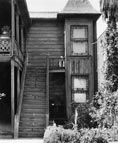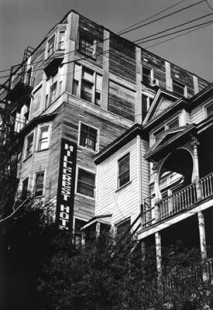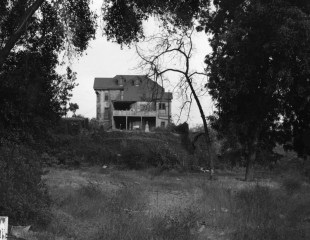Edendale: Chapter 7
The Seventh Chapter of “Edendale,” Bunker Hill, by Phyl M. Noir
Photograph of house on Bunker Hill – before the City tore down all of the old houses – is courtesy of the Los Angeles Public Library.
By Phyl M. Noir
Dupont first built a dynamite factory in Hopewell then switched to the manufacture of guncotton during World War I. In 1923 Tubize Corporation established a plant at the old Dupont site but everyone kept calling the plant Dupont. The same year, the city of Hopewell annexed the neighboring town of City Point. The Honeywell Corporation and Hercules Chemical sited their plants on the James River. Smurfit-Stone Container Corporation built a paper mill.
Every once in a while, a breeze scoured away the stinking yellow cloud that hung over Hopewell. Nothing lived in the inlet. It was dead water.
Joy lived in a wood frame house in the Polish enclave near the confluence of the James and the Appomattox rivers with her brother Roland, their uncle Aloysius and father Joe who worked at the paper mill and their alcoholic grandmother.
Babucia was tall and skinny, and her face looked much older than she was. She never went out, not even to mass.
Uncle Ally went to the store for groceries. Babucia drank vodka from a water glass and made the cabbage rolls with tomato sauce from a can mixed with lemon juice and sugar, cooked bacon and kept the white fat in a jar to fry with, rolled out dough, cut it into circles and made biscuits. She boiled fruit with sugar to make jelly. Then she went back to bed.
The brothers came home from work and fed the children. When they said anything, it was about the Jews and the blacks that were all Communists and wanted to take over. The children cleaned up the dishes.
Her mother had painted the toilet red and hung curtains with tulip prints on the windows and scoured the wood floors and metal kitchen sink. She didn’t talk much but she sang opera because Father Fabian had bought them a phonograph player and a book full of music and taught her how to sing. When she sang, she sounded like a different person.
After their mother ran away, Joy and Roland were among the free children who spent some time in school, had dinner, and trespassed in the backyards of Civil War-era mansions.
Father Fabian took her under his wing. He taught her how to paint: tree bark is not one color, he said. Sky shows through the leaves. Let reality come to you through your eyes: in a mass of foliage the eye catches red. He bought her charcoals and erasers and watercolors and five brushes in different lengths.
Joe didn’t want her to have anything to do with Father Fabian. Uncle Ally walked the children home after mass soon after that and said that was because Fabian once beat Joe up. A week after Christmas, Fabian and Michael had chased Joe through the streets near City Point and threw him to the ground and beat Joe until he was unconscious.
Then Uncle Ally told Joy and Roland that their grandfather died in an explosion at the plant, and their grandmother had taken Joe and Ally down to City Point and tried to drown them in the James River because she had no way to support them. There was no welfare in those days and she didn’t want charity. She couldn’t go through with drowning them, so Father Fabian – who was then a new priest and very young — arranged for Joe and Ally to live in the Catholic orphanage out to Farmingdale. That’s why Joe was so rough, he said. Joe had been only a little fellow when he went to the orphanage. He was always afraid he’d be left again, and it turned out that he was.
Father Michael was the top priest in their church. He was theatrical: he gave out real palm fronds on Palm Sunday; he burned a fire in the church balcony at Easter and roared the hominy down at the congregation; he half drowned adult converts when he baptized them in the cold James River; he arranged for a parishioner to stagger down the church aisles wearing a crown of chains, and then Father Michael burst the chains with his hands to show that death is the prison of your mind, and that faith will free you. At the end of each mass, everyone grasped the hand of the person next to him and repeated the Lord’s Prayer.
When Joy was eighteen, the choir and the organist performed Bach’s Mass in B Minor. The colossal Kyrie Eleison pleaded for mercy in a stinging call in the church in the little Southern city where they all knew they lived with one foot in the grave from the moments of their births.
The next day, Roland drove Joy up from Hopewell to Newell in West Virginia when he got his first car, the Dodge De Lux, which still revealed a swollen Art Deco silhouette under ten years’ rust and upholstery rot.
For two years, Joy worked in Newell at the Homer Laughlin China Co. hand-painting their best line of porcelain with images drawn from eighteenth century French paintings: a lady wearing volumes of satin with lace at the neck and sleeves and a gentleman wearing britches that stopped at the knee courted her beneath stylized Cypress branches under plush clouds set in a placid sky, and he held out a sock to the lady. You couldn’t tell unless you looked hard that it was a sock. Sometimes she painted the sock white and sometimes Dresden blue.
After work, Joy watched the trucks moving terrifyingly black into the red setting sun and one day packed her portfolio of sketches, her suitcase, and her bag full of satin fabrics that she had bent and folded into models for her porcelain paintings, and she went to the Lincoln highway and got a ride on a truck that took her to Aurora, Illinois, where she worked on floral designs for Aurora Silverplate Manufacturing Company, and then she got on another truck and left Aurora.
The truck driver stopped at Grimes Point, near Fallon. He insisted she walk with him along the National Recreation Trail to see the petroglyph from 8,000 years ago, at the end of the last Ice Age, when Indians lived on marshy lakes and etched pictures into chocolate colored stone showing stylized mountains as MMMMMM and stick figure people who looked as if they were wearing space suits from the Flash Gordon television series.
They drove on 99 through the Central Valley. They went by yellow hills under blue skies that crumpled together like clasped fingers. Tractors and cars had traced thin parallel paths along the edges of the hills closest to the 99. The truck driver’s left arm burned in the sunlight.
Near Chowchilla, she saw a boy on a horse on the top of one of the hills. He yelled, “Giddyup Geronimo,” and the horse turned and took him down the other side of the hill to a house built of old railroad ties, which had a well in front of it made out of stones.
She believed until she got to the corner of Hollywood and Vine that she could live for a time off the oranges and grapefruits and avocados hanging from trees but there were no citrus trees left in Hollywood.
She got on a trolley that took her to the Grand Central Market downtown. The shop owners spread saw dust on the floor and sold fruit, vegetables and also meats and fish in glass cases. It was cool inside the market even though it was open on two sides, and she found a group of chairs and sat down for a long time.
Her mother’s husband Sam was a Jew. He drove to get her in his station wagon, which said “Fine French Dry Cleaners” on the side and took her to the house in The Avenues, and then they all went out to dinner at Cantor’s on Fairfax in the Pontiac.
The distances in Los Angeles enchanted Joy. Anyone could be anything in those distances. You could reinvent your life by driving away from one neighborhood into another.
Sam said he didn’t drink coffee. He only drank tea with lemon. Joy’s mother said that she needed to eat meat. Joy’s half-sister only looked at her and said nothing, but that was because Justine had said Joy was Cyd’s cousin. The little girl didn’t know they were sisters.
Sam dry cleaned movie stars’ clothes and sent their shirts to a laundry to be washed, starched and ironed and returned with a paper ribbon around them. He said Jimmy Stewart was so skinny he wore padded suits. Walt Disney was a secret smoker. He said he had a lot of linen handkerchiefs movie stars left in their pockets.
Sam got Joy a job at the Disney studio out in Burbank coloring in cartoons drawn by men. It was still rare in those days for women to be animators. She quit after two months and became a nurse’s aide.
She moved to Bunker Hill where she rented a room in a house that had once been a rich man’s mansion that took a year to build, but which smelled like dry rot. The house had stained glass windows, and sunlight through the windows cast red, gold and green patterns on bare parquetry floors no one had polished in fifty years.
Small children roamed all day on the paths between the old mansions and the derelict tenements. Sometimes they poked a stick into one of the incinerators used to burn garbage and walked around carrying the flaming stick like a torch and chased an imagined Frankenstein. Mostly, they jumped up onto porches and down from them and looked into the faces of men sleeping off drunken stupors. The children were like Joy and Roland had been when they were little, except none of the parents or grandparents beat on each other. They all seemed like gentle people, even the black people and the Mexicans.
The grocery store, dairy, newspaper and magazine store, and bookstore were on the Hill, and the children went inside of the stores through cavernous halls with no windows and painted-over glass transoms with walls the color of caves until they reached cheerier rooms that sold newspapers and milk.
The pensioners who lived on Bunker Hill listened to the radio, read newspapers, took Angel’s Flight down to Grand Central Market and collected bibelots and porcelain dishes, and, once, Joy found one of the dishes she had painted back in West Virginia in an old lady’s kitchen, a woman who had been allocating typeface when a bomb ignited the leaky gas pipes in the Los Angeles Times building in 1910.
She told the woman she had painted the dish.
“Very nice. Tell me, why does the man offer his beloved a sock?”
She didn’t wait for an answer and told her Joy that a bomb killed the labor movement in Los Angeles. Job Harriman had been running for mayor on the Socialist ticket and could have won but the McNamara brothers pleaded guilty to the bombing, even though one of them was up to San Francisco when the bomb went off, and no one every knew if they had really done it. The old woman didn’t believe they did it. We could have had a Red Los Angeles, she said.
The Times, she said, was after Bunker Hill now. One of the Chandlers was going to put up a music pavilion. There would be banks up there, and fountains. All the poor would have to leave. Joy should start packing: the Los Angeles Times always won.
More views of Bunker Hill, courtesy of the L.A. Public Library






